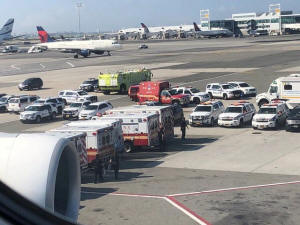|
Two health scares at U.S. airports tied
to Mecca pilgrims: U.S. officials
 Send a link to a friend
Send a link to a friend
 [September 08, 2018]
By Julie Steenhuysen [September 08, 2018]
By Julie Steenhuysen
CHICAGO (Reuters) - Two major health scares
at U.S. airports involving inbound flights are related to pilgrims
returning from the Hajj, the Muslim pilgrimage to the holy city of
Mecca, Saudi Arabia, which ended in late August, U.S. health officials
said on Friday.
On Wednesday, U.S. health officials sent an emergency response team with
mobile diagnostic equipment to John F. Kennedy International Airport in
New York after they were told that more than 100 passengers aboard an
Emirates airlines flight from Dubai were experiencing flu-like symptoms.
Dr. Martin Cetron, director for the division of Global Migration and
Quarantine at the U.S. Centers for Disease Control and Prevention, told
Reuters in a telephone interview that health officials evaluated nearly
549 passengers at the airport, and sent a total of 11 people to a local
hospital for more testing.
Ten people were tested for a battery of respiratory viruses and bacteria
in hopes of ruling out serious pathogens that could present a public
health threat.
Two of them tested positive for an especially virulent type of influenza
A virus, and one of the two, who was gravely ill with pneumonia, was
co-infected with another respiratory virus, Cetron said. A third person
tested positive for a cold virus.

All three had taken part in the Hajj, which this year drew some 2
million people to Mecca, Cetron said.
Seven crew members, who boarded the flight in Dubai and were not at the
pilgrimage, tested negative for a number of respiratory infections of
public health concern, Cetron said.
The next day, two flights arriving in Philadelphia from Europe were
screened by medical teams after 12 passengers reported flu-like
symptoms. One of them had visited Mecca for the Hajj.
Cetron said health officials in New York had been prepared to quarantine
a large group of sick passengers in an area at the airport. From a total
of 11 passengers taken to hospital for evaluation, 10 were tested for
respiratory symptoms; one showed signs of food poisoning.
"It was a much smaller incident. That's not uncommon," Cetron said.
"Often the incoming information from multiple sources can be exaggerated
beyond what we really find."
[to top of second column]
|

The emergency services are seen, after the passengers were taken ill
on a flight from New York to Dubai, on JFK Airport, New York, U.S.,
September 05, 2018 in this still image obtained from social media.
Larry Coben/via REUTERS

All 10 patients with respiratory symptoms tested negative for the
Middle East Respiratory Syndrome or MERS, a highly infectious and
deadly respiratory infection that was first identified in the Middle
East in 2012.
The CDC was not alerted in advance about the two flights that landed
in Philadelphia from Paris and Munich, but several travelers had
complained of illness, triggering a "medical review" of 250
passengers from those flights, a spokesman said.
Twelve passengers were found to have sore throats and coughs, and
one also tested positive for the flu, a CDC spokesman confirmed.
The responses were part of a well-rehearsed network of public health
officials trained to identify and contain pathogens as U.S. airports
and ports of entry, Cetron said.
"Our most critical issue was to rule several respiratory illnesses
of urgent public health significance," Cetron said.
Cetron said the CDC monitors databases to track outbreaks of
infectious disease that could post a treat in the United States.
Although unlikely, MERS was definitely a concern that the team
needed to rule out, he said.
"That was a low-probability, high consequence event that we wanted
to rule out," he said.
The CDC said in a statement that the cases were a reminder that flu
season is coming, and urged all U.S. citizens six months or older to
get a flu shot by the end of October.
(Reporting by Julie Steenhuysen; Additional reporting by Gina
Cherelus in New York)
[© 2018 Thomson Reuters. All rights
reserved.]
Copyright 2018 Reuters. All rights reserved. This material may not be published,
broadcast, rewritten or redistributed.
Thompson Reuters is solely responsible for this content.
 |